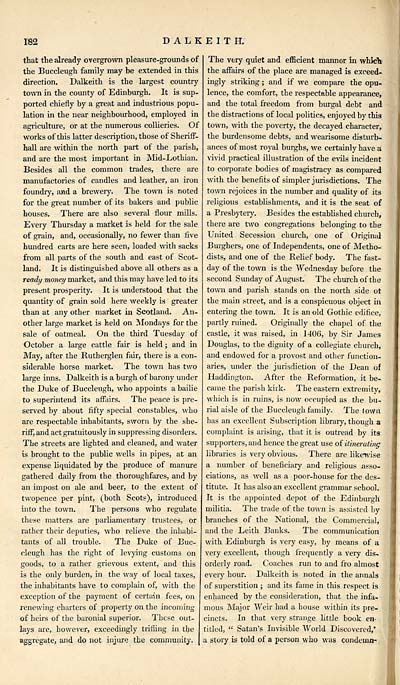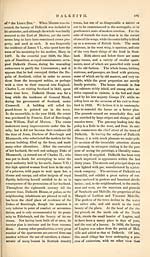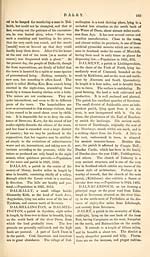Gazetteer of Scotland > Volume 1
(210) Page 182
Download files
Complete book:
Individual page:
Thumbnail gallery: Grid view | List view

182
DALKEITH.
that the already overgrown pleasure-grounds of
the Buccleugh family may he extended in this
direction, Dalkeith is the largest country
town in the county of Edinburgh. It is sup-
ported chiefly by a great and industrious popu-
lation in the near neighbourhood, employed in
agriculture, or at the numerous collieries. Of
works of this latter description, those of Sheriff-
hall are within the north part of the parish,
and are the most important in Mid-Lothian.
Besides all the common trades, there are
manufactories of candles and leather, an iron
foundry, and a brewery. The town is noted
for the great number of its bakers and public
houses. There are also several flour mills.
Every Thursday a market is held for the sale
of grain, and, occasionally, no fewer than five
hundred carts are here seen, loaded with sacks
from all parts of the south and east of Scot-
land. It is distinguished above all others as a
ready money market, and this may have led to its
present prosperity. It is understood that the
quantity of grain sold here weekly is greater
than at any other market in Scotland. An-
other large market is held on Mondays for the
sale of oatmeal. On the third Tuesday of
October a large cattle fair is held ; and in
May, after the Rutherglen fair, there is a con-
siderable horse market. The town has two
large inns. Dalkeith is a burgh of barony under
the Duke of Buccleugh, who appoints a bailie
to superintend its affairs. The peace is pre-
served by about fifty special constables, who
are respectable inhabitants, sworn by the she-
riff, and act gratuitously in suppressing disorders.
The streets are lighted and cleaned, and water
is brought to the public wells in pipes, at an
expense liquidated by the produce of manure
gathered daily from the thoroughfares, and by
an impost on ale and beer, to the extent of
twopence per pint, (both Scots), introduced
into the town. The persons who regulate
these matters are parliamentary trustees, or
rather their deputies, who relieve the inhabi-
tants of all trouble. The Duke of Buc-
cleugh has the right of levying customs on
goods, to a rather grievous extent, and this
is the only burden, in the way of local taxes,
the inhabitants have to complain of, with the
exception of the payment of certain fees, on
renewing charters of property on the incoming
of heirs of the baronial superior. These out-
lays are, however, exceedingly trifling in the
aggregate, and do not injure the community.
The very quiet and efficient manner in which
the affairs of the place are managed is exceed-
ingly striking ; and if we compare the opu-
lence, the comfort, the respectable appearance,
and the total freedom from burgal debt and
the distractions of local politics, enjoyed by this
town, with the poverty, the decayed character,
the burdensome debts, and wearisome disturb-
ances of most royal burghs, we certainly have a
vivid practical illustration of the evils incident
to corporate bodies of magistracy as compared
with the benefits of simpler jurisdictions. The
town rejoices in the number and quality of its
religious establishments, and it is the seat of
a Presbytery. Besides the established church,
there are two congregations belonging to the
United Secession church, one of Original
Burghers, one of Independents, one of Metho-
dists, and one of the Relief body. The fast-
day of the town is the Wednesday before the
second Sunday of August. The church of the
town and parish stands on the north side ot
the main street, and is a conspicuous object in
entering the town. It is an old Gothic edifice,
partly ruined. Originally the chapel of the
castle, it was raised, in 1406, by Sir James
Douglas, to the dignity of a collegiate church,
and endowed for a provost and other function-
aries, under the jurisdiction of the Dean of
Haddington. After the Reformation, it be-
came the parish kirk- The eastern extremity,
which is in ruins, is now occupied as the bu-
rial aisle of the Buccleugh family. The town
has an excellent Subscription library, though a
complaint is arising, that it is outread by its
supporters, and hence the great use of itinerating
libraries is very obvious. There are likewise
a number of beneficiary and religious asso-
ciations, as well as a poor-house for the des-
titute. It has also an excellent grammar school.
It is the appointed depot of the Edinburgh
militia. The trade of the town is assisted by
branches of the National, the Commercial,
and the Leith Banks. The communication
with Edinburgh is very easy, by means of a
very excellent, though frequently a very dis-
orderly road. Coaches run to and fro almost
every hour. Dalkeith is noted in the annals
of superstition ; and its fame in this respect is
enhanced by the consideration, that the infa-
mous Major Weir had a house within its pre-
cincts. In that very strange little book en-
titled, " Satan's Invisible World Discovered,'
a story is told of a person who was condemn-
DALKEITH.
that the already overgrown pleasure-grounds of
the Buccleugh family may he extended in this
direction, Dalkeith is the largest country
town in the county of Edinburgh. It is sup-
ported chiefly by a great and industrious popu-
lation in the near neighbourhood, employed in
agriculture, or at the numerous collieries. Of
works of this latter description, those of Sheriff-
hall are within the north part of the parish,
and are the most important in Mid-Lothian.
Besides all the common trades, there are
manufactories of candles and leather, an iron
foundry, and a brewery. The town is noted
for the great number of its bakers and public
houses. There are also several flour mills.
Every Thursday a market is held for the sale
of grain, and, occasionally, no fewer than five
hundred carts are here seen, loaded with sacks
from all parts of the south and east of Scot-
land. It is distinguished above all others as a
ready money market, and this may have led to its
present prosperity. It is understood that the
quantity of grain sold here weekly is greater
than at any other market in Scotland. An-
other large market is held on Mondays for the
sale of oatmeal. On the third Tuesday of
October a large cattle fair is held ; and in
May, after the Rutherglen fair, there is a con-
siderable horse market. The town has two
large inns. Dalkeith is a burgh of barony under
the Duke of Buccleugh, who appoints a bailie
to superintend its affairs. The peace is pre-
served by about fifty special constables, who
are respectable inhabitants, sworn by the she-
riff, and act gratuitously in suppressing disorders.
The streets are lighted and cleaned, and water
is brought to the public wells in pipes, at an
expense liquidated by the produce of manure
gathered daily from the thoroughfares, and by
an impost on ale and beer, to the extent of
twopence per pint, (both Scots), introduced
into the town. The persons who regulate
these matters are parliamentary trustees, or
rather their deputies, who relieve the inhabi-
tants of all trouble. The Duke of Buc-
cleugh has the right of levying customs on
goods, to a rather grievous extent, and this
is the only burden, in the way of local taxes,
the inhabitants have to complain of, with the
exception of the payment of certain fees, on
renewing charters of property on the incoming
of heirs of the baronial superior. These out-
lays are, however, exceedingly trifling in the
aggregate, and do not injure the community.
The very quiet and efficient manner in which
the affairs of the place are managed is exceed-
ingly striking ; and if we compare the opu-
lence, the comfort, the respectable appearance,
and the total freedom from burgal debt and
the distractions of local politics, enjoyed by this
town, with the poverty, the decayed character,
the burdensome debts, and wearisome disturb-
ances of most royal burghs, we certainly have a
vivid practical illustration of the evils incident
to corporate bodies of magistracy as compared
with the benefits of simpler jurisdictions. The
town rejoices in the number and quality of its
religious establishments, and it is the seat of
a Presbytery. Besides the established church,
there are two congregations belonging to the
United Secession church, one of Original
Burghers, one of Independents, one of Metho-
dists, and one of the Relief body. The fast-
day of the town is the Wednesday before the
second Sunday of August. The church of the
town and parish stands on the north side ot
the main street, and is a conspicuous object in
entering the town. It is an old Gothic edifice,
partly ruined. Originally the chapel of the
castle, it was raised, in 1406, by Sir James
Douglas, to the dignity of a collegiate church,
and endowed for a provost and other function-
aries, under the jurisdiction of the Dean of
Haddington. After the Reformation, it be-
came the parish kirk- The eastern extremity,
which is in ruins, is now occupied as the bu-
rial aisle of the Buccleugh family. The town
has an excellent Subscription library, though a
complaint is arising, that it is outread by its
supporters, and hence the great use of itinerating
libraries is very obvious. There are likewise
a number of beneficiary and religious asso-
ciations, as well as a poor-house for the des-
titute. It has also an excellent grammar school.
It is the appointed depot of the Edinburgh
militia. The trade of the town is assisted by
branches of the National, the Commercial,
and the Leith Banks. The communication
with Edinburgh is very easy, by means of a
very excellent, though frequently a very dis-
orderly road. Coaches run to and fro almost
every hour. Dalkeith is noted in the annals
of superstition ; and its fame in this respect is
enhanced by the consideration, that the infa-
mous Major Weir had a house within its pre-
cincts. In that very strange little book en-
titled, " Satan's Invisible World Discovered,'
a story is told of a person who was condemn-
Set display mode to: Large image | Transcription
Images and transcriptions on this page, including medium image downloads, may be used under the Creative Commons Attribution 4.0 International Licence unless otherwise stated. ![]()
| Gazetteers of Scotland, 1803-1901 > Gazetteer of Scotland > Volume 1 > (210) Page 182 |
|---|
| Permanent URL | https://digital.nls.uk/97426882 |
|---|
| Description | Volume I: Abbey to Glenartney. |
|---|---|
| Attribution and copyright: |
|
| Description | By Robert Chambers and William Chambers. Glasgow: Blackie & Son, 1838. 2 volumes. |
|---|---|
| Shelfmark | NF.1461.g.7 |
| Additional NLS resources: | |

